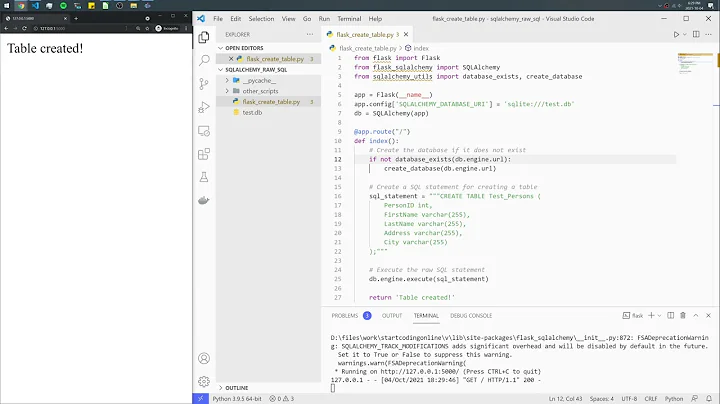How do I get a raw, compiled SQL query from a SQLAlchemy expression?
Solution 1
This blog provides an updated answer.
Quoting from the blog post, this is suggested and worked for me.
>>> from sqlalchemy.dialects import postgresql
>>> print str(q.statement.compile(dialect=postgresql.dialect()))
Where q is defined as:
>>> q = DBSession.query(model.Name).distinct(model.Name.value) \
.order_by(model.Name.value)
Or just any kind of session.query().
Thanks to Nicolas Cadou for the answer! I hope it helps others who come searching here.
Solution 2
The documentation uses literal_binds to print a query q including parameters:
print(q.statement.compile(compile_kwargs={"literal_binds": True}))
the above approach has the caveats that it is only supported for basic types, such as ints and strings, and furthermore if a bindparam() without a pre-set value is used directly, it won’t be able to stringify that either.
The documentation also issues this warning:
Never use this technique with string content received from untrusted input, such as from web forms or other user-input applications. SQLAlchemy’s facilities to coerce Python values into direct SQL string values are not secure against untrusted input and do not validate the type of data being passed. Always use bound parameters when programmatically invoking non-DDL SQL statements against a relational database.
Solution 3
This should work with Sqlalchemy >= 0.6
from sqlalchemy.sql import compiler
from psycopg2.extensions import adapt as sqlescape
# or use the appropiate escape function from your db driver
def compile_query(query):
dialect = query.session.bind.dialect
statement = query.statement
comp = compiler.SQLCompiler(dialect, statement)
comp.compile()
enc = dialect.encoding
params = {}
for k,v in comp.params.iteritems():
if isinstance(v, unicode):
v = v.encode(enc)
params[k] = sqlescape(v)
return (comp.string.encode(enc) % params).decode(enc)
Solution 4
Thing is, sqlalchemy never mixes the data with your query. The query and the data are passed separately to your underlying database driver - the interpolation of data happens in your database.
Sqlalchemy passes the query as you've seen in str(myquery) to the database, and the values will go in a separate tuple.
You could use some approach where you interpolate the data with the query yourself (as albertov suggested below), but that's not the same thing that sqlalchemy is executing.
Solution 5
For the MySQLdb backend I modified albertov's awesome answer (thanks so much!) a bit. I'm sure they could be merged to check if comp.positional was True but that's slightly beyond the scope of this question.
def compile_query(query):
from sqlalchemy.sql import compiler
from MySQLdb.converters import conversions, escape
dialect = query.session.bind.dialect
statement = query.statement
comp = compiler.SQLCompiler(dialect, statement)
comp.compile()
enc = dialect.encoding
params = []
for k in comp.positiontup:
v = comp.params[k]
if isinstance(v, unicode):
v = v.encode(enc)
params.append( escape(v, conversions) )
return (comp.string.encode(enc) % tuple(params)).decode(enc)
Related videos on Youtube
cce
I was co-founder of Tracelytics, a distributed tracing and APM service that is now part of AppOptics. AppOptics is a SaaS service that provides: distributed tracing and application performance monitoring (APM) host, infrastructure, and container monitoring (using a host agent) custom metrics, dashboards, and alerts (using our agent or metrics REST API) The AppOptics host agent provides plugins for integrating with metrics systems such as Statsd, Prometheus, Graphite, InfluxDB, as well as popular open-source software like Docker, Kubernetes, MySQL, Postgres, Nginx, Apache, Cassandra, etc. Try it out!
Updated on July 24, 2021Comments
-
cce almost 3 years
I have a SQLAlchemy query object and want to get the text of the compiled SQL statement, with all its parameters bound (e.g. no
%sor other variables waiting to be bound by the statement compiler or MySQLdb dialect engine, etc).Calling
str()on the query reveals something like this:SELECT id WHERE date_added <= %s AND date_added >= %s ORDER BY count DESCI've tried looking in query._params but it's an empty dict. I wrote my own compiler using this example of the
sqlalchemy.ext.compiler.compilesdecorator but even the statement there still has%swhere I want data.I can't quite figure out when my parameters get mixed in to create the query; when examining the query object they're always an empty dictionary (though the query executes fine and the engine prints it out when you turn echo logging on).
I'm starting to get the message that SQLAlchemy doesn't want me to know the underlying query, as it breaks the general nature of the expression API's interface all the different DB-APIs. I don't mind if the query gets executed before I found out what it was; I just want to know!
-
cce over 13 yearsThanks for this! Sadly I'm using MySQL so my dialect is "positional" and needs to have a params list rather than a dictionary. Currently trying to get your example to work with that..
-
cce over 13 yearswhy isn't it the same thing? I understand the DB-API is doing transactions, possibly re-ordering queries, etc, but could it be modifying my query more than this?
-
nosklo over 13 years@cce: you're trying to find the final query.
SELECT id WHERE date_added <= %s AND date_added >= %s ORDER BY count DESCIS the final query. Those%sare sent to the database by sqlalchemy -- sqlalchemy NEVER puts the actual data in place of the %s -
nosklo over 13 years@cce: Some dbapi modules don't do that either - that is often done by the database itself
-
 Ed_WFerreira over 13 yearsPlease don't use
Ed_WFerreira over 13 yearsPlease don't useadaptin this manner. At a minimum call prepare() on the return value from it each time, providing the connection as an argument, so it can do proper quoting. -
albertov over 13 years@Alex: What would be the correct way to do proper quoting with psycopg? (besides calling prepare() on the return value, which you seem to imply is not optimal)
-
cce over 13 yearsaha I see what you're saying, thanks — digging further in
sqlalchemy.dialects.mysql.mysqldb,do_executemany()passes the statement & parameters separately to the MySQLdb cursor. yay indirection! -
 Ed_WFerreira over 13 yearsSorry I think my phrasing was bad, as long as you do call obj.prepare(connection) you should be ok. This is because "good" APIs that libpq provides for quoting require the connection (and it provides things like encoding for unicode strings).
Ed_WFerreira over 13 yearsSorry I think my phrasing was bad, as long as you do call obj.prepare(connection) you should be ok. This is because "good" APIs that libpq provides for quoting require the connection (and it provides things like encoding for unicode strings). -
albertov over 13 yearsThanks. I've tried calling
prepareon the return value but is seems that it doesn't have that method:AttributeError: 'psycopg2._psycopg.AsIs' object has no attribute 'prepare'. I'm using psycopg2 2.2.1 BTW -
albertov over 13 yearsOk, it seems
prepare()isn't available in my old psycopg2 version, 2.3.1 seems to have it: initd.org/psycopg/docs/… -
Damien over 9 yearsIs there an easy way to get the values as a dictionary ?
-
tourdownunder over 9 yearsThe port of this function to python 3 is stackoverflow.com/a/28227450/567606
-
TankorSmash over 8 years@cce did you figure out the MySQL bit?
-
cce over 8 yearsHI @TankorSmash I did and shared it in a different answer below stackoverflow.com/a/4618647/112380
-
 horcle_buzz over 8 yearsAwesome! I just needed the bound parameter list being sent to MySQL and modifying the above to just
horcle_buzz over 8 yearsAwesome! I just needed the bound parameter list being sent to MySQL and modifying the above to justreturn tuple(params)worked like a charm! You saved me countless hours of having to go down an extremely painful road. -
 Hannele almost 8 years@Damien given
Hannele almost 8 years@Damien givenc = q.statement.compile(...), you can just getc.params -
Piotr Dobrogost about 7 yearsHow is this answer better/different than AndyBarr's one posted 2 years earlier?
-
 eric about 7 yearsAndyBarr's answer includes an example of generating a query statement with a DBSession whereas this answer includes an example using the declarative API and select method. With respect to compiling the query statement with a certain dialect, the answers are the same. I use SQLAlchemy to generate raw queries and then execute them with Twister's adbapi. For this use case, knowing how to compile the query without a session and to extract the query string and parameters is useful.
eric about 7 yearsAndyBarr's answer includes an example of generating a query statement with a DBSession whereas this answer includes an example using the declarative API and select method. With respect to compiling the query statement with a certain dialect, the answers are the same. I use SQLAlchemy to generate raw queries and then execute them with Twister's adbapi. For this use case, knowing how to compile the query without a session and to extract the query string and parameters is useful. -
 Hannele about 6 yearsThe post is tagged with mysql, so the postgresql details in this answer aren't really relevant.
Hannele about 6 yearsThe post is tagged with mysql, so the postgresql details in this answer aren't really relevant. -
 Hannele about 6 yearsStatement doesn't show you what the parameters are, if you have some kinds of filters set up.
Hannele about 6 yearsStatement doesn't show you what the parameters are, if you have some kinds of filters set up. -
 Patrick B. almost 6 yearsIf I understand the OP correctly, he wants the final query. Printing with specifying a dialect (here postgres) still gives me the placeholders instead of the literal values. @Matt's answer does the job. Getting the SQL with placeholders can be simplier achieved with the
Patrick B. almost 6 yearsIf I understand the OP correctly, he wants the final query. Printing with specifying a dialect (here postgres) still gives me the placeholders instead of the literal values. @Matt's answer does the job. Getting the SQL with placeholders can be simplier achieved with theas_scalar()-method ofQuery. -
 Ben almost 5 yearsFrom within the PyCharm debugger, the following worked for me... qry.compile().params
Ben almost 5 yearsFrom within the PyCharm debugger, the following worked for me... qry.compile().params -
 Hannele almost 5 yearsInteresting, could be SQLAlchemy has changed a bit since I wrote this answer.
Hannele almost 5 yearsInteresting, could be SQLAlchemy has changed a bit since I wrote this answer. -
André C. Andersen about 4 years@PatrickB. I agree. Matt's answer should be considered the "correct" answer. I get the same result as this by just doing
str(q). -
Justin Palmer almost 4 yearsThank you! This was extremely helpful, allowed me to use pandas read_sql function painlessly!
-
nirvana-msu over 3 yearsThis is the best answer for Postgres! Unlike the method that uses
literal_binds, this works with any parameter types. -
cikatomo about 3 yearshow do we do it for Core expression?
-
cikatomo about 3 years@JustinPalmer does pandas not accept the query? Does it accept Core expression?
-
cikatomo about 3 yearshow can we do it for Core expression?
-
cikatomo about 3 years@eric and how come you are not using just raw SQL?
-
 Ham almost 3 yearsUnfortunately , the
Ham almost 3 yearsUnfortunately , theliteral_bindsapproach is not able to bind pythonbytesdata type with compiled SQL statement. In such case you may need to convertbytesto hex string in advance then figure out how the hex string can be passed with some built-in functions supported in your database -
 Deepam Gupta over 2 yearsdoing
Deepam Gupta over 2 yearsdoingq.statement.compile(compile_kwargs={"literal_binds": True}).stringwill return the string without calling str()







